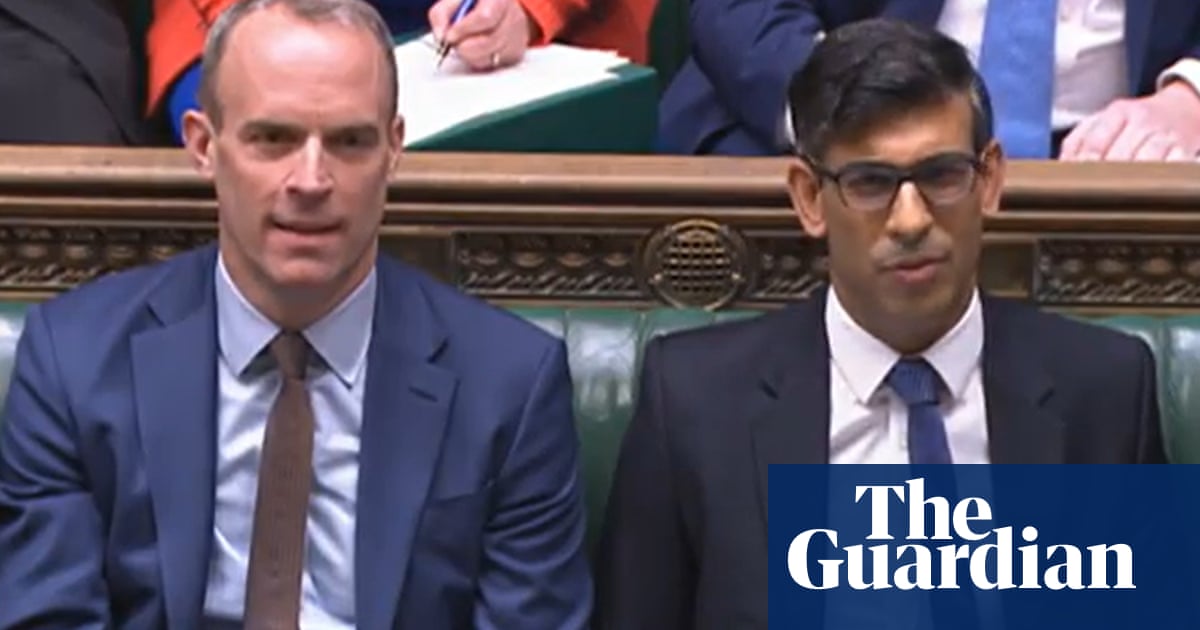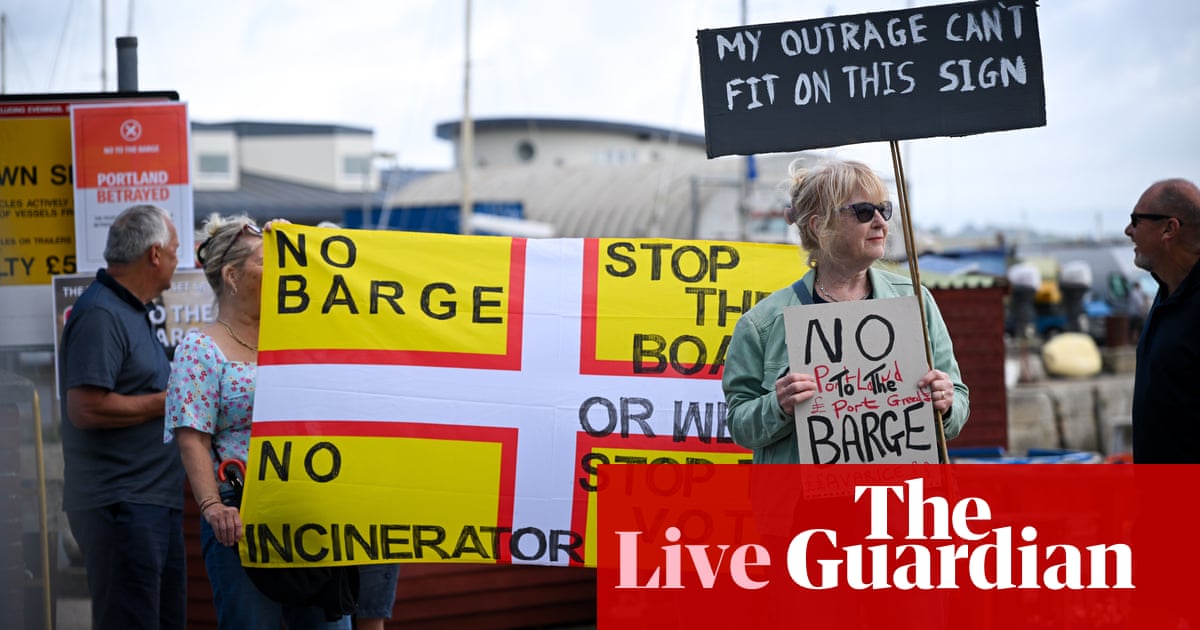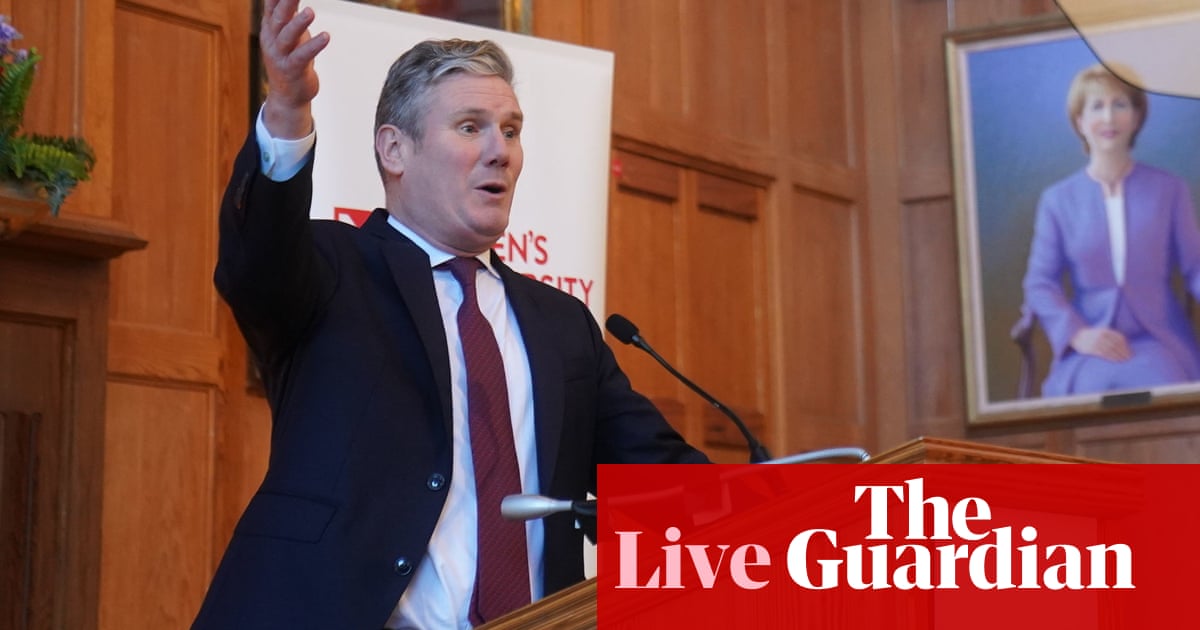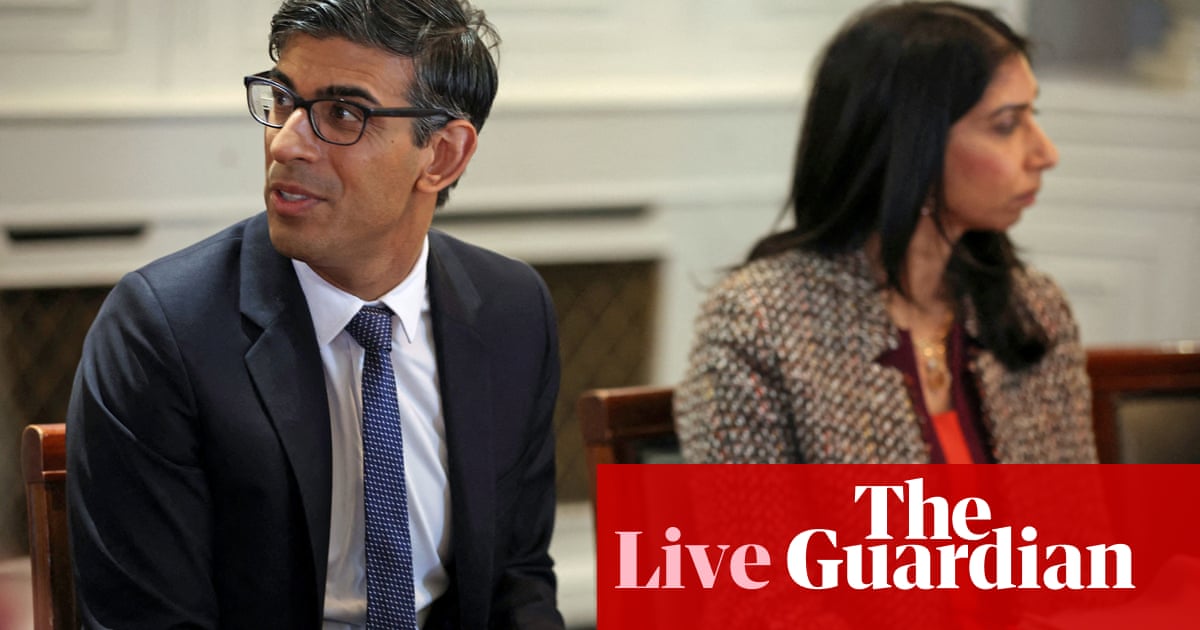
Sunak refuses to say if his parliamentary aide, Craig Williams, knew about election timing when he placed bet
Rishi Sunak has refused to say whether Craig Williams, his parliamentary private secretary, knew that Sunak was going to call a July election when he placed a bet on that, three days before the announcement.
In an interview with the BBC’s Vicki Young at the G7 summit in Italy, asked if Sunak knew that announcement was coming, Sunak replied:
It was very disappointing news. You will have seen Craig Williams say that it was a huge error of judgment.
Now there’s a independent inquiry that is ongoing, which is necessarily confidential, as well as independent, and you’ll appreciate that, given that, it wouldn’t be appropriate for me to comment while that’s ongoing.
When it was put to him that he could easily clear the matter up by answering the question now, Sunak repeated the point about wanting to let the inquiry proceed. Asked if he had spoken to the inquiry, he said it would not be right to comment.
Early evening summary
Rishi Sunak’s closest parliamentary aide, Craig Williams, has apologised for placing a £100 bet on a July election three days before the prime minister announced the date for the poll. In an interview Sunak refused to say whether Williams knew about the timing of the election when he placed his bet. (See 4.51pm.)
Keir Starmer has vowed to “turn the page for ever” on held-back potential as he put wealth creation and economic growth at the heart of Labour’s manifesto.
Labour is offering “more austerity but painted red”, Plaid Cymru leaders have said as they launched the party’s manifesto.
That is all from me. But Amy Sedghi has just launched a new live blog that will be covering the ITV’s seven-party debate taking place tonight. You can read it here.
Yet another thinktank has said that Labour, like the Conservative party, is failing to acknowledge the need for more public spending after the election. This is from Stephen Millard, deputy director at the National Institute of Economic and Social Research.
Campaigners criticise Labour for not include pledge to tackle carer"s allowance scandal in manifesto
It was “hugely disappointing” Labour had failed to commit to tackling the carer’s allowance scandal in its manifesto, campaigners said.
The unfair treatment of unpaid carers – highlighted in recent weeks through the Guardian’s reporting of carer’s allowance benefit overpayments – has generated public outrage and been routinely compared to the Post Office scandal.
Of the three main parties, so far only the Liberal Democrats – whose leader Ed Davey is a carer for his disabled teenage son – have promised to fix flaws in the carer’s allowance benefit that have led to tens of thousands of vulnerable carers unwittingly plunged into thousands of pounds of debt and in some cases prosecuted for fraud.
Carers Trust’s chief executive, Kirsty McHugh, said:
If it forms the next government, the [Labour] party needs to be brave and ambitious. It must overhaul carer’s allowance, introduce paid carers’ leave and ensure the National Care Service meets unpaid carers’ needs and enshrines their rights.
This should be a day one priority. Many of the UK’s seven million carers are at breaking point. There are 1.5 million people caring for more than 50 hours a week, while 28% of carers have been driven into poverty.
These are ordinary people trying to do the right thing by friends and family, filling holes left by our crumbling social care system. What they need is urgent action, whoever forms the next government.
Labour’s shadow welfare secretary Liz Kendall told the Guardian last week the carer’s allowance injustices were “unforgivable” and promised to “put the system right” if elected to government.
Corbyn accuses Starmer of "rewriting history" after Starmer says he was certain Labour would lose 2019 election
Jeremy Corbyn has accused Keir Starmer of “rewriting history” when Starmer said last night he never expected Labour to win the 2019 election.
In the Sky News leaders special last night, Starmer used that line to justify why he had described Corbyn as someone who would make a great PM during the campaign. Starmer implied he was just being loyal to a colleague.
Asked about Starmer saying he was certain Labour would lose in 2019, Corbyn told PA Media:
Well, he never said that to me, at any time. And so I just think rewriting history is no help.
It shows double standards, shall we say, that he now says he always thought that, but he never said it at the time, or anything about it.
He was part of the campaign. He and I spoke together at events and I find it actually quite sad … He was in the shadow cabinet, he was at the clause V meeting. Both those meetings unanimously agreed the 2019 manifesto, and he was there.
Here is an Election Extra podcast, with Heather Stewart’s assessment of the Labour manifesto.
Labour manifesto plans for Lords reform don"t address "fundamental problem" with it, campaigners say
The Electoral Reform Society says the plans in Labour’s manifesto for House of Lords reform don’t address the “fundamental problem” with it.
This is what the manifesto says about the Lords.
The next Labour government will therefore bring about an immediate modernisation, by introducing legislation to remove the right of hereditary peers to sit and vote in the House of Lords. Labour will also introduce a mandatory retirement age. At the end of the parliament in which a member reaches 80 years of age, they will be required to retire from the House of Lords.
Labour will ensure all peers meet the high standards the public expect of them, and we will introduce a new participation requirement as well as strengthening the circumstances in which disgraced members can be removed. We will reform the appointments process to ensure the quality of new appointments and will seek to improve the national and regional balance of the second chamber.
Whilst this action to modernise the House of Lords will be an improvement, Labour is committed to replacing the House of Lords with an alternative second chamber that is more representative of the regions and nations. Labour will consult on proposals, seeking the input of the British public on how politics can best serve them.
And this is what Darren Hughes, chief executive of the ERS, said about the plans.
We agree with the statement in the manifesto that reform of the Lords is ‘long-overdue and essential’ and welcome that Labour is pledging to take the first steps to tackle some of the worst excesses of the upper chamber, such as its ballooning size and the fact we still have 92 all-male hereditary peers wielding influence over legislation due to birthright.
However, we do have concerns about the potentially arbitrary impact of an age cap at 80 for peers, as some are still very active and making valuable contributions over that age. Also, for peers starting their career in their late 20s and early 30s, as we now have, that is still effectively a guaranteed 50 years of unelected legislating, which is an absurd situation for a modern democracy.
While we welcome that Labour is proposing to take initial steps on Lords reform, the proposals in the manifesto alone fall short of addressing the fundamental problem with the second chamber: the unchecked and undemocratic way new members are added, with prime ministers able to stuff unlimited numbers of new peers into the Lords on a whim. The last three prime ministers alone have created more than 120 new peers between them.
Other party leaders are engaged in conventional campaigning, but the Lib Dems’ desire to ensure they contine to provide the most interesting photo opportunities means that Ed Davey’s schedule looks more like a month-long outward bound holiday. Today he was on an assault course at Arena Pursuits outdoor centre in Flimwell, Kent,
A little remarked upon justice policy in the Labour manifesto has been welcomed by the charity Children Heard And Seen, a charity in England and Wales that focuses solely on supporting children who have a parent in prison.
In their manifesto, Labour have stated that “the children of those who are imprisoned are at far greater risk of being drawn into crime than their peers. We will ensure that those young people are identified and offered support to break the cycle”.
This follows Kerry McCarthy’s recent 10-minute rule bill, calling for it to be a statutory requirement for the government to identify and support children with a parent in prison.
The UK currently has no national mechanism for identifying and supporting children with a parent in prison – so there is no exact number of how many children have parents in prison.
“This groundbreaking policy commitment is the first time the issue of parental imprisonment has been included in a major political party’s manifesto and it is welcomed by Children Heard and Seen,” said Sarah Burrows, the charity’s founder.
Sunak says publication of Labour"s manifesto means voters now have "crystal clear" choice on tax
In his TV interview Rishi Sunak also said the publication of the Labour manifesto showed that there was a “crystal clear” choice for people on tax. He said:
There’s a clear choice at this election. We published a manifesto that’s going to cut taxes for people in this country and the Labour manifesto that was published today made it clear that taxes are going to rise.
Multiple independent sources [eg, see 4.42pm] demonstrate that the tax burden under Labour will rise to the highest levels in history.
And in contrast, if I’m reelected, we will cut taxes for people at every stage of their life, cutting taxes for people at work, cutting tax for people who are self employed, cutting tax for people buying their first home, cutting tax for pensioners and cutting taxes for families. That’s the type of country I want to lead.
Sunak refuses to say if his parliamentary aide, Craig Williams, knew about election timing when he placed bet
Rishi Sunak has refused to say whether Craig Williams, his parliamentary private secretary, knew that Sunak was going to call a July election when he placed a bet on that, three days before the announcement.
In an interview with the BBC’s Vicki Young at the G7 summit in Italy, asked if Sunak knew that announcement was coming, Sunak replied:
It was very disappointing news. You will have seen Craig Williams say that it was a huge error of judgment.
Now there’s a independent inquiry that is ongoing, which is necessarily confidential, as well as independent, and you’ll appreciate that, given that, it wouldn’t be appropriate for me to comment while that’s ongoing.
When it was put to him that he could easily clear the matter up by answering the question now, Sunak repeated the point about wanting to let the inquiry proceed. Asked if he had spoken to the inquiry, he said it would not be right to comment.
Tory post-election tax rises, plus Labour"s manifesto plans, would take tax burden to record level, says thinktank
In its response to the Labour manifesto, the Resolution Foundation, a thinktank focused on the needs of low and medium-income families, praises the plans to boost employment rights, saying they amount to “the biggest shake-up of the workplace in a generation, with the laudable aim of boosting the quality of work”.
But it says “this boldness contrasts with a politically cautious approach to the public finances, which means a future Labour chancellor could be left implementing significant tax rises and public service cuts over the next parliament.”
It says that that, under these plans, and mostly because of future tax rises already baked in under the Tories, the tax burden will rise to its highest level ever. It says:
Labour’s plans to raise taxes by £8.5bn a year over the next parliament, coupled with £23.5bn post-election tax rises announced by Jeremy Hunt in the last parliament, would leave the UK’s tax-to-GDP ratio rising from 36.5% in 2024-25 to 37.4% to 2028-29 – equivalent to a tax rise of £1,100 a year per household (in 2028-29 prices) – with the UK’s tax take reaching its highest on record.
This scale of this rising tax take in the next parliament would be modest compared to the last parliament (which rose by 3.3 percentage points) but comparable in scale to the 2001-05 parliament (when it also rose by 0.9 percentage points).
The decision to accept the continuation of the six-year freeze to tax thresholds would see the personal tax bills of a typical employee earning £30,000 rise by £180 a year by 2027-28.
And it says that Labour would oversee spending cuts in some departments because it is largely accepting government plans. It says:
Labour’s modest pledges to increase spending largely lie in departments that are already protected, such as education and health and social care. This means that an incoming Labour government would still need to deliver around £18bn of cuts to unprotected departments such as Transport, Justice and the Home Office. Neither party has said anything on how they intend to deliver these extremely challenging cuts.
What Labour manifesto says about relations with EU
The Conservatives has also issued a press release claiming that the Labour manifesto shows Keir Starmer will “unravel Brexit”.
This is based on the pledge in the document to “seek to negotiate a veterinary agreement to prevent unnecessary border checks and help tackle the cost of food”.
The Tories says EU officials have briefed that a deal of this kind would require the UK to accept oversight by the European court of justice. In their news release they quote Steve Barclay, the environment secretary, saying:
Today Keir Starmer has confirmed what he’s been hinting at for months – that Labour would once again make the UK a rule-taker from Brussels.
Others have argued that what is significant about the manifesto is how limited it is in terms of its ambition for a closer relationship with the EU. This is from Timothy Garton Ash, the writer and Europe expert
Foreign policy part of Labour’s just-launched election manifesto. Hyper-cautious on Europe. It even repeats that ridiculous oxymoronic formula ‘make Brexit work’.
This is what the manifesto says about relations with the EU.
With Labour, Britain will stay outside of the EU. But to seize the opportunities ahead, we must make Brexit work. We will reset the relationship and seek to deepen ties with our European friends, neighbours and allies. That does not mean reopening the divisions of the past. There will be no return to the single market, the customs union, or freedom of movement.
Instead, Labour will work to improve the UK’s trade and investment relationship with the EU, by tearing down unnecessary barriers to trade. We will seek to negotiate a veterinary agreement to prevent unnecessary border checks and help tackle the cost of food; help our touring artists; and secure a mutual recognition agreement for professional qualifications to help open up markets for UK service exporters.
Labour will seek an ambitious new UK-EU security pact to strengthen cooperation on the threats we face. We will rebuild relationships with key European allies, including France and Germany, through increased defence and security cooperation. We will seek new bilateral agreements and closer working with Joint Expeditionary Force partners. This will strengthen Nato and keep Britain safe.












